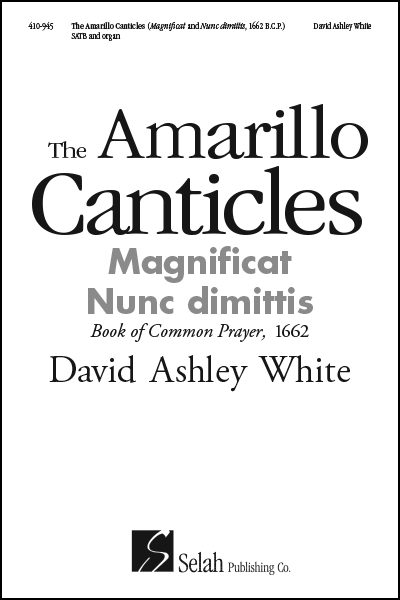|
Composer
David Ashley White
Text Magnificat, Nunc dimittis, tr. Book of Common Prayer, 1979 [Rite II] or 1662 Book of Common Prayer
Voicing SATB and organ
Topic Advent, Mary, Evensong
Price $2.75 (U.S.)
Released 2/00
Cat. no. 410-944 (1979), 410-945 (1662)
Difficulty Difficult
|
Order Rite II version!
Order 1662 version!
Order 1662 PDF download! Min. of 5
Description
Commissioned by St. Peter's Episcopal Church in Amarillo, Texas, this setting of the Magnificat and Nunc dimittis for Evening Prayer is rich and festive without being unduly difficult. The style is reminiscent of Herbert Howells, with the organ accompaniment providing color, contrast, and support. Also available in an edition using the 1662 Book of Common Prayer texts.
Anthem text
My soul proclaims the greatness of the Lord,
my spirit rejoices in God my Savior;
for he has looked with favor on his lowly servant.
From this day all generations will call me blessed:
the Almighty has done great things for me,
and holy is his Name.
He has mercy on those who fear him in every generation.
He has shown the strength of his arm,
he has scattered the proud in their conceit.
He has cast down the mighty from their thrones,
and has lifted up the lowly.
He has filled the hungry with good things,
and the rich he has sent away empty.
He has come to the help of his servant Israel,
for he has remembered his promise of mercy,
The promise he made to Abraham and his children for ever.
Glory to the Father, and to the Son, and to the Holy Spirit:
as it was in the beginning, is now, and will be for ever. Amen.
Lord, you now have set your servant free
to go in peace as you have promised;
for these eyes of mine have seen the Savior,
whom you have prepared for all the world to see:
A light to enlighten the nations,
and the glory of your people Israel.
--Magnificat, Nunc dimittis, tr. Book of Common Prayer, 1979, Rite II
|
|

 Rite II Rite II
 1662 1662
Review
"Finally, there is David Ashley White's superior Amarillo Canticles for Evening. To say that these settings are Howellesque is to praise them in the highest. It also needs to be said that where David is inspired by themercurial evanescence of that style, he repays the debt to the fullest, taking this most Anglican idiom to a place only David could go. The occasional singing of Evensong (as opposed to the weekly and daily singing) is fraught with many dangers: the Psalm is often embarrassing, the choir is unprepared to go smoothly from one thing to the other, and there is a general atmosphere of 'We need at least another year's rehearsal!' To that complex of issues, these Canticles bring an accessibility which will delight less than professional choirs, even as it rewards them for labors. This is gorgeous music, folks" --AAM Journal, May/June 2002 |



